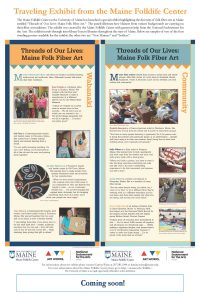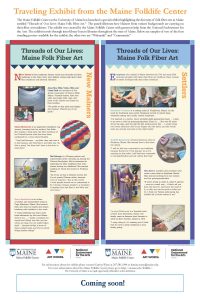Threads of Our Lives
About Threads of Our Lives
In 2016, the MFC launched a special exhibit highlighting the diversity of folk fiber arts in Maine entitled “Threads of Our Lives: Maine Folk Fiber Art.” The exhibit was made possible through a National Endowment of the Arts grant the MFC received in 2015. The exhibit features four 3’x7′ free-standing panels: “Wabanaki,” “Settlers,” “New Mainers,” and “Community.” The panels illustrate how Mainers from various backgrounds are carrying on their fiber art traditions.
What Are Folklore, Folklife, and Folk Art?
Folklore and folklife are interchangeable terms used to describe informal traditional culture. The oral, material, and customary traditions we learn not from the classroom, but from our folk groups (families, friends, community). An example I find useful is Thanksgiving. You might say that your Thanksgiving is just a normal American Thanksgiving, but what exactly does that mean to you and how did you learn those expectations? Does it mean there is football on TV or played in the yard, or do you watch A Charlie Brown Thanksgiving, or do you head off to early Black Friday shopping, or start decorating for Christmas? Does it mean everyone brings their signature dish or does one person do all the cooking? Do you have collard greens as a side dish or a salad made with Jell-O? Does the meal start with a prayer or a toast or with everyone saying something they are thankful for? Do you all sit down together at a specific time or eat when you get hungry? Is it extended family, your neighborhood, your nuclear family, or do you have a Friendsgiving? What would make it feel wrong to you? All of those elements are part of the folklore for the group you have Thanksgiving dinner with and are influenced by your region, background, family, and life experiences. There isn’t an official, institutional guide to how Thanksgiving should be, which makes it informal. It’s traditional because the knowledge and beliefs are passed from person to person, whether that is vertically from generation to generation or horizontally from friend to friend.
Folk art then is an art form that has been non-institutionally learned from a neighbor, relative, or someone else in your community and is influenced by your folk group.
Threads of Our Lives Supplemental Information
There was so much great and fascinating information we heard and saw during our research for the Threads of Our Lives exhibit that couldn’t fit into four 3’x7′ panels. Here you can discover those as well. We are adding transcripts as they are finalized, the full audio files, short videos, and an artist directory for libraries looking for an artist for programming. We hope you enjoy this supplementary material and get to see the exhibit in person at your local library.
Transcripts and Audio:
NA4011 Danielle “Dani” Beaupré Recording Part 1 and Part 2 (Franco-American knitter)
NA4011 Danielle “Dani” Beaupré Transcript (Franco-American knitter)
NA4012 Carol F. Thomas Recording
NA4013 Mei Selvage Recording (Chinese mixed media artist)
NA4014 Rana O’Connor Recording (Iranian quilter)
NA4014 Rana O’Connor Transcript (Iranian quilter)
NA4015 Sally Wilson Recording (Yankee knitter)
NA4018 Frances “Gal” Frey Recording (Passamaquoddy beader)
NA4027 Susan Watson (Felter)
NA4028 Kavya Seshachar (Indian crocheter and embroiderer)
NA4029 Anna Mae Hilty, Velma Hilty, and Lizzie Esch Transcript (Amish sewers, quilters, weavers)
NA4234 This is a short clip from the Bangor Public Library demonstration with Simin Khosravani (an apprentice Kashkooli rug weaver) and Jennifer Neptune (a Penobscot beader). Simin and Jennifer are discussing the challenges facing their art traditions, including cultural appropriation.
Videos:
These are videos created by Kyle Hadyniak for the Maine Folklife Center to add to the Threads of Our Lives traveling poster exhibit. Videos were only made for a handful of the artists. In most cases, two videos were made: a longer video (generally around 5 minutes) and a shorter video.
Directory:
We created a directory of the artists we talked with during this project who are interested in and able to do fiber related programming at libraries. By agreeing to be in the directory, the women have consented to being approached about doing programming, but retained the right refuse to do a program if they wish.


